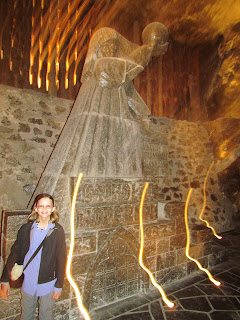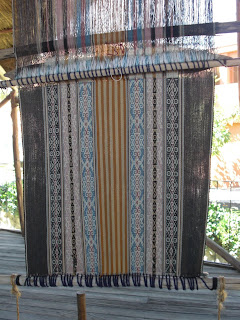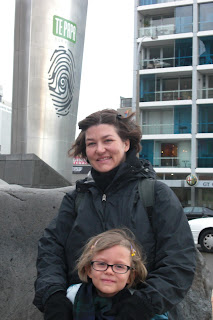Bodies, Books, and Benedictions
 We got up relatively early, and
after a nutritious breakfast of cocoa pops, started the day. Our first stop was
Trinity College. Since it was drizzling and cold, we opted to skip the tour and
head to the main exhibit: the Book of Kells, which is now 4 books, one per
Gospel. There was a preliminary gallery that discussed the material the pages
were made out of (vellum, or calf hide) the substances used to create the
different colors (minerals and powders) and large prints of some of the more
intricately decorated pages from the Book, detailing the images and their
symbolism. The Book is about 1200 years old, and from the few pages we were
allowed to see, still appears to be in excellent condition.
We got up relatively early, and
after a nutritious breakfast of cocoa pops, started the day. Our first stop was
Trinity College. Since it was drizzling and cold, we opted to skip the tour and
head to the main exhibit: the Book of Kells, which is now 4 books, one per
Gospel. There was a preliminary gallery that discussed the material the pages
were made out of (vellum, or calf hide) the substances used to create the
different colors (minerals and powders) and large prints of some of the more
intricately decorated pages from the Book, detailing the images and their
symbolism. The Book is about 1200 years old, and from the few pages we were
allowed to see, still appears to be in excellent condition.
Once we finished gawking at the
Book, we headed to the Long Room, a huge space containing about 200,000 books
on two floors. Sadly, said books were off-limits, but I still enjoyed staring
at them. In addition to the gigantic collection of books, a number of busts
lined the walls, and on display was a large Irish harp from the 15th
century. It was really marvelous.
 We exited the library and trekked to
the National Museum of Ireland’s archaeology building. Before beginning a journey
through Irish history, we stopped at the café, and I enjoyed a lovely chocolate
croissant. We started our traverse through the museum with an exceedingly
cheerful exhibit about bog bodies, human remains (often human sacrifices) that
have been remarkably well preserved in peat. To top off this delightful
information, there were four real bog bodies, including the Oldcroghan Man, who
is now just a torso and two arms. After this gallery, we went back to the
prehistoric era, which contained not only a large amount of weapons, but lots
of gold and amber jewelry. Next up was medieval Ireland, including several
restored outfits fished from bogs, as well as human remains, religious relics,
and more jewelry and weaponry.
We exited the library and trekked to
the National Museum of Ireland’s archaeology building. Before beginning a journey
through Irish history, we stopped at the café, and I enjoyed a lovely chocolate
croissant. We started our traverse through the museum with an exceedingly
cheerful exhibit about bog bodies, human remains (often human sacrifices) that
have been remarkably well preserved in peat. To top off this delightful
information, there were four real bog bodies, including the Oldcroghan Man, who
is now just a torso and two arms. After this gallery, we went back to the
prehistoric era, which contained not only a large amount of weapons, but lots
of gold and amber jewelry. Next up was medieval Ireland, including several
restored outfits fished from bogs, as well as human remains, religious relics,
and more jewelry and weaponry. After this, we
walked to the Chester Beatty Library. The first floor was called Arts of the
Book, which, not surprisingly, contained a large number of old texts. The
gallery outlined the various ways that intricate pictures were inked onto the
page (mainly by scraping images onto surfaces such as metal or wood before
rubbing ink on said surface and pressing it onto paper). The exhibit housed
books such as copies of the Qu’ran, the Book of the Dead, and the Bible. The
second floor, entitled Sacred Traditions, focused primarily on books and images
about Buddhism, Islam, and Christianity. There were intricate drawings of
prophets and evangelists, and key pages from important documents pertaining to
each of these religions. In addition, there were images of important stories,
such as the tale of a Buddhist monk who cut off his eyelids, meditated for 9
years, and lost use of his legs. Once we finished wandering, we stopped for
drinks at the café before heading to evensong at St. Patrick’s Cathedral, which
was spectacular. After this, we headed back to the hostel for an early night.
After this, we
walked to the Chester Beatty Library. The first floor was called Arts of the
Book, which, not surprisingly, contained a large number of old texts. The
gallery outlined the various ways that intricate pictures were inked onto the
page (mainly by scraping images onto surfaces such as metal or wood before
rubbing ink on said surface and pressing it onto paper). The exhibit housed
books such as copies of the Qu’ran, the Book of the Dead, and the Bible. The
second floor, entitled Sacred Traditions, focused primarily on books and images
about Buddhism, Islam, and Christianity. There were intricate drawings of
prophets and evangelists, and key pages from important documents pertaining to
each of these religions. In addition, there were images of important stories,
such as the tale of a Buddhist monk who cut off his eyelids, meditated for 9
years, and lost use of his legs. Once we finished wandering, we stopped for
drinks at the café before heading to evensong at St. Patrick’s Cathedral, which
was spectacular. After this, we headed back to the hostel for an early night. 




Comments